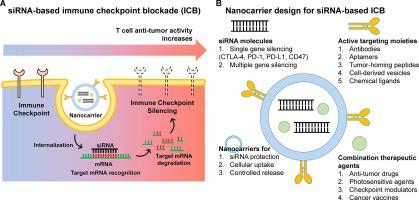当前位置:
X-MOL 学术
›
Adv. Drug Deliver. Rev.
›
论文详情
Our official English website, www.x-mol.net, welcomes your
feedback! (Note: you will need to create a separate account there.)
Advancing cancer immunotherapy through siRNA-based gene silencing for immune checkpoint blockade
Advanced Drug Delivery Reviews ( IF 15.2 ) Pub Date : 2024-04-16 , DOI: 10.1016/j.addr.2024.115306 Youngjin Choi 1 , Su Hyun Seok 1 , Hong Yeol Yoon 2 , Ju Hee Ryu 1 , Ick Chan Kwon 3
Advanced Drug Delivery Reviews ( IF 15.2 ) Pub Date : 2024-04-16 , DOI: 10.1016/j.addr.2024.115306 Youngjin Choi 1 , Su Hyun Seok 1 , Hong Yeol Yoon 2 , Ju Hee Ryu 1 , Ick Chan Kwon 3
Affiliation

|
Cancer immunotherapy represents a revolutionary strategy, leveraging the patient's immune system to inhibit tumor growth and alleviate the immunosuppressive effects of the tumor microenvironment (TME). The recent emergence of immune checkpoint blockade (ICB) therapies, particularly following the first approval of cytotoxic T-lymphocyte-associated protein 4 (CTLA-4) inhibitors like ipilimumab, has led to significant growth in cancer immunotherapy. The extensive explorations on diverse immune checkpoint antibodies have broadened the therapeutic scope for various malignancies. However, the clinical response to these antibody-based ICB therapies remains limited, with less than 15% responsiveness and notable adverse effects in some patients. This review introduces the emerging strategies to overcome current limitations of antibody-based ICB therapies, mainly focusing on the development of small interfering ribonucleic acid (siRNA)-based ICB therapies and innovative delivery systems. We firstly highlight the diverse target immune checkpoint genes for siRNA-based ICB therapies, incorporating silencing of multiple genes to boost anti-tumor immune responses. Subsequently, we discuss improvements in siRNA delivery systems, enhanced by various nanocarriers, aimed at overcoming siRNA's clinical challenges such as vulnerability to enzymatic degradation, inadequate pharmacokinetics, and possible unintended target interactions. Additionally, the review presents various combination therapies that integrate chemotherapy, phototherapy, stimulatory checkpoints, ICB antibodies, and cancer vaccines. The important point is that when used in combination with siRNA-based ICB therapy, the synergistic effect of traditional therapies is strengthened, improving host immune surveillance and therapeutic outcomes. Conclusively, we discuss the insights into innovative and effective cancer immunotherapeutic strategies based on RNA interference (RNAi) technology utilizing siRNA and nanocarriers as a novel approach in ICB cancer immunotherapy.
中文翻译:

通过基于 siRNA 的基因沉默来阻断免疫检查点,推进癌症免疫治疗
癌症免疫疗法代表了一种革命性的策略,利用患者的免疫系统来抑制肿瘤生长并减轻肿瘤微环境(TME)的免疫抑制作用。最近出现的免疫检查点阻断 (ICB) 疗法,特别是在首次批准细胞毒性 T 淋巴细胞相关蛋白 4 (CTLA-4) 抑制剂(如伊匹单抗)之后,导致了癌症免疫疗法的显着增长。对多种免疫检查点抗体的广泛探索拓宽了多种恶性肿瘤的治疗范围。然而,这些基于抗体的 ICB 疗法的临床反应仍然有限,反应率低于 15%,并且在一些患者中存在明显的不良反应。本综述介绍了克服当前基于抗体的 ICB 疗法局限性的新兴策略,主要关注基于小干扰核糖核酸 (siRNA) 的 ICB 疗法和创新递送系统的开发。我们首先强调基于 siRNA 的 ICB 疗法的多种目标免疫检查点基因,结合多个基因的沉默来增强抗肿瘤免疫反应。随后,我们讨论了通过各种纳米载体增强的 siRNA 递送系统的改进,旨在克服 siRNA 的临床挑战,例如易受酶促降解、药代动力学不足以及可能的意外靶点相互作用。此外,该综述还提出了整合化疗、光疗、刺激检查点、ICB 抗体和癌症疫苗的各种联合疗法。 重要的一点是,当与基于 siRNA 的 ICB 疗法联合使用时,传统疗法的协同效应得到加强,改善宿主免疫监视和治疗结果。最后,我们讨论了基于 RNA 干扰 (RNAi) 技术的创新和有效的癌症免疫治疗策略,利用 siRNA 和纳米载体作为 ICB 癌症免疫治疗的新方法。
更新日期:2024-04-16
中文翻译:

通过基于 siRNA 的基因沉默来阻断免疫检查点,推进癌症免疫治疗
癌症免疫疗法代表了一种革命性的策略,利用患者的免疫系统来抑制肿瘤生长并减轻肿瘤微环境(TME)的免疫抑制作用。最近出现的免疫检查点阻断 (ICB) 疗法,特别是在首次批准细胞毒性 T 淋巴细胞相关蛋白 4 (CTLA-4) 抑制剂(如伊匹单抗)之后,导致了癌症免疫疗法的显着增长。对多种免疫检查点抗体的广泛探索拓宽了多种恶性肿瘤的治疗范围。然而,这些基于抗体的 ICB 疗法的临床反应仍然有限,反应率低于 15%,并且在一些患者中存在明显的不良反应。本综述介绍了克服当前基于抗体的 ICB 疗法局限性的新兴策略,主要关注基于小干扰核糖核酸 (siRNA) 的 ICB 疗法和创新递送系统的开发。我们首先强调基于 siRNA 的 ICB 疗法的多种目标免疫检查点基因,结合多个基因的沉默来增强抗肿瘤免疫反应。随后,我们讨论了通过各种纳米载体增强的 siRNA 递送系统的改进,旨在克服 siRNA 的临床挑战,例如易受酶促降解、药代动力学不足以及可能的意外靶点相互作用。此外,该综述还提出了整合化疗、光疗、刺激检查点、ICB 抗体和癌症疫苗的各种联合疗法。 重要的一点是,当与基于 siRNA 的 ICB 疗法联合使用时,传统疗法的协同效应得到加强,改善宿主免疫监视和治疗结果。最后,我们讨论了基于 RNA 干扰 (RNAi) 技术的创新和有效的癌症免疫治疗策略,利用 siRNA 和纳米载体作为 ICB 癌症免疫治疗的新方法。































 京公网安备 11010802027423号
京公网安备 11010802027423号